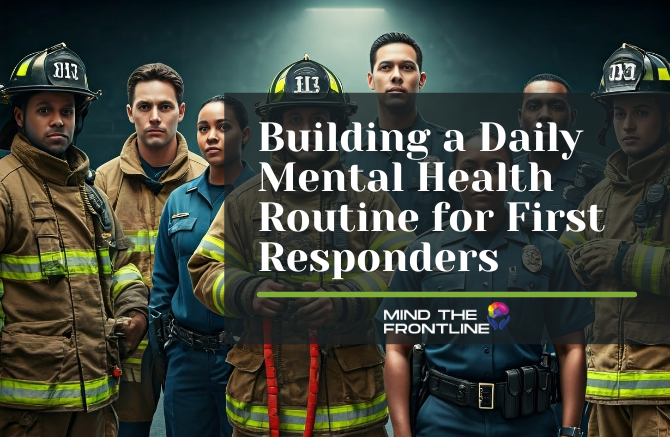Exploring Ketamine Therapy: A New Frontier in First Responder Mental Health Treatment
A New Frontier in First Responder Mental Health Treatment In the demanding world of first responders, the toll on mental health is profound....
2 min read
 Chris Smetana, AS, FP-C, CCP-C, NRP | Founder/President
:
Oct 6, 2023
Chris Smetana, AS, FP-C, CCP-C, NRP | Founder/President
:
Oct 6, 2023
-Jan-17-2024-05-34-37-2754-PM.png)
Understanding the Vital Role of Sleep in First Responder Mental Health
Sleep, a fundamental pillar of well-being, often stands neglected in the lives of first responders. The demands of their roles, with irregular hours and high-stress levels, can severely disrupt their sleep patterns. In this blog post, we will unravel the vital importance of sleep for first responders' mental health and provide valuable resources to help optimize their sleep routine.
.png?width=300&height=175&name=MTFL%20%20Blog%20Image%20(33).png)
.png?width=300&height=175&name=MTFL%20%20Blog%20Image%20(34).png)
Restorative Power: Sleep allows the brain and body to rejuvenate, repair, and consolidate memories.
Emotional Regulation: Adequate sleep is crucial for maintaining emotional stability and resilience.
.png?width=300&height=175&name=MTFL%20%20Blog%20Image%20(35).png)
Stress Reduction: Quality sleep significantly lowers stress levels and enhances coping mechanisms.
Enhanced Focus and Alertness: Proper rest leads to improved concentration and better decision-making.
.png?width=300&height=175&name=MTFL%20%20Blog%20Image%20(36).png)
Mood Swings: Lack of sleep can lead to irritability, anxiety, and depression.
Impaired Cognitive Function: Sleep deprivation affects memory, creativity, and critical thinking.
.png?width=300&height=175&name=MTFL%20%20Blog%20Image%20(37).png)
Establish a Routine: Stick to a consistent sleep schedule to regulate your body's internal clock.
Create a Relaxing Pre-Sleep Ritual: Incorporate calming activities like reading or gentle stretches before bedtime.
.png?width=300&height=175&name=MTFL%20%20Blog%20Image%20(38).png)
Dark and Cool Room: Ensure your sleeping space is conducive to a relaxing slumber.
Comfortable Bedding: Invest in a comfortable mattress and pillows for better quality sleep.
.png?width=300&height=175&name=MTFL%20%20Blog%20Image%20(39).png)
Avoid Stimulants: Reduce caffeine intake, especially in the latter half of the day.
Digital Detox: Avoid screens at least an hour before bedtime to promote better sleep.
.png?width=300&height=175&name=MTFL%20%20Blog%20Image%20(40).png)
Physical Fatigue: Regular exercise promotes physical tiredness, aiding better sleep.
Stress Reduction: Exercise helps in managing stress levels, leading to more restful sleep.
.png?width=300&height=175&name=MTFL%20%20Blog%20Image%20(41).png)
Consult a Specialist: If sleep troubles persist, consult a healthcare professional for guidance.
Therapeutic Interventions: Cognitive-behavioral therapy for insomnia (CBT-I) can be highly effective.
.png?width=300&height=175&name=MTFL%20%20Blog%20Image%20(42).png)
Sleep Apps: Utilize apps designed to improve sleep through guided relaxation and breathing exercises.
Books and Podcasts: Explore educational resources on sleep hygiene and the science of sleep.
.png?width=300&height=175&name=MTFL%20%20Blog%20Image%20(43).png)
Resources and Guidance: Explore our platform for articles and tips on enhancing sleep quality.
Webinars and Workshops: Join our informative sessions focused on promoting better sleep for first responders.
.png?width=300&height=175&name=MTFL%20%20Blog%20Image%20(44).png)
Quality sleep is a cornerstone of mental health, especially for first responders. By understanding its importance and incorporating healthy sleep habits into their routine, first responders can significantly enhance their overall well-being. Let us collectively champion a culture that values restful sleep, enabling our brave first responders to face each day with renewed energy and resilience.
#FirstResponderWellbeing #QualitySleepMatters #MindTheFrontline
-4.png)
A New Frontier in First Responder Mental Health Treatment In the demanding world of first responders, the toll on mental health is profound....

First responders face unique mental health challenges due to the nature of their jobs. Building a daily mental health routine can be a powerful tool...
-Jan-17-2024-05-31-23-8542-PM.png)
How First Responders Can Support Their Own First responders are the backbone of our society, rushing in when others are rushing out. The weight of...